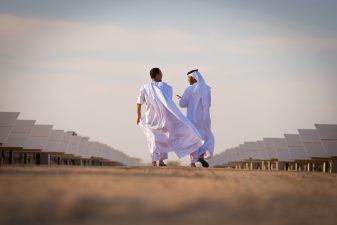Able to store enough heat to generate power that can last well into the night, Masdar’s Gemasolar, built in Spain last year was state of the art in solar thermal energy storage, able to reach temperatures of over 500°C. Now a U.S. startup funded by the Obama administration energy department with a $3.3 million ARPA-E grant has a way to make that even better.
Halotechnics has devised the perfect material to store higher heat, so that more solar energy can be stored to keep the lights on well after sundown.
Their innovation could make solar thermal as cheap and convenient as fossil fuels, but with none of the nasty side effects of burning fossil energy – like asthma, and petrostate political systems, and an unlivable climate for our children.
This could be very big news for Desertec and the MENA region, because it is at center stage for solar thermal development.
The way the heat-storage in solar thermal plants works now, salts are heated up above their melting point, up to their highest working temperature (565 ⁰C), stored till needed in a large insulated tank, and used to generate steam which drives a turbine to generate the electricity. Because this molten salt mixture holds the heat, it can be tapped on demand, and in Masdar’s case, provide 15 hours of solar power a day.
(Related: Masdar Opens First Baseload Solar in Spain – Gemasolar.)
Halotechnics was spun out of a chemical spun-off from high-throughput chemicals screening company Symyx (now a part of Accelrys) that specializes in combing through multitudes of chemical combinations for various needs, and was able to check out over 18,000 combinations of materials to find the perfect combination to hold heat.
The perfect solution turned out to be two materials—one an improved salt mixture, and the other a completely new form of glass which can operate at greatly increased temperatures, reducing the amount of storage material needed and potentially improving efficiency.
These allow for about three times more energy storage than current solar thermal plants, which could reduce the size of the mirror array needed by up to about 25 percent, increasing their efficiency.
The start-up’s invention could be an important connection for the MENA region, which is fast becoming center stage in solar thermal techology, because this is where some of the largest solar thermal plants in the world are under development (Desertec Begins: 500 MW Moroccan Solar in 2012) (Tunisia Announces 4th Desertec Deal and 2 GW of Solar!) as well as for Abu Dhabi’s Masdar.
Masdar’s Gemasolar solar thermal plant in Spain can store heat so it is able to operate for fifteen hours a day, because they use the molten salt as the transfer fluid as well as the storage medium (most companies only use the molten salt for storage, not transfer).
Gemasolar gets temperatures of over 500 °C. But Halotechnics has developed a molten salt that could operate up to 700 °C (with the same melting point).
“To hit that six-cent goal, or get close to it, you have to go to a higher-temperature system,” says Mark Mehos, manager of the National Renewable Energy Laboratory’s Concentrated Solar Power program, in Golden, Colorado.
“The systems that are commercial today are limited to about 565 °C—that’s the molten salt tower plants,” says Mehos. “The tower and optics themselves can hit higher temperatures, but you’re limited by the salt temperature right now.”
The materials are being tested for long-term compatibility with the steel pipes and containers used in storage systems, and the company plans to start pilot tests in 18 months.
Its initial research was funded so far by Uncle Sam, but now the company is now looking for an investor to commercialize the innovation.
Hmmm… I wonder which MENA region solar thermal developer might be interested in partnering with this company?
Related:
Which Solar Technologies Will Have the Most Investment Appeal
Airlight Energy Brings CSP to Morocco from Switzerland
MENA Cleantech Sees ‘Existential Need’ for CSP in Middle East





Comments are closed.